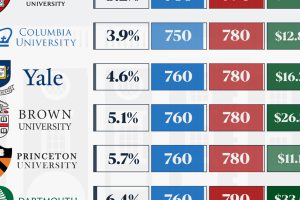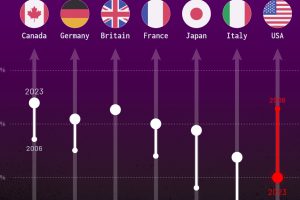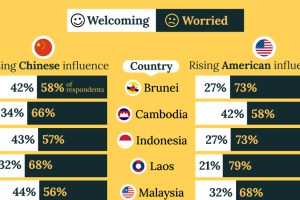The 24 Universal Character Strengths
The study of personality is one of the most commonly researched areas in psychology.
In the 1990s, Dr. Martin Seligman and Dr. Christopher Peterson began examining the best qualities in people. After several years of research, they identified 24 character strengths universally found in everyone. When individuals build on these strengths, research finds, it can improve their quality of life.
This graphic shows the 24 universal strengths from the VIA Institute on Character.
A Closer Look at the 24 Strengths
The VIA’s research grouped 24 universal strengths into six main categories referred to as virtues.
Seligman found that these virtues were seen across cultures and history, and the spectrum of character strengths are a form of living out various virtues.
Interestingly, what they found was that each of these strengths of character can emerge through effort—instead of being fixed qualities found in a person.
| Category | Strengths |
|---|---|
| 🦁 Courage | Enthusiasm Integrity Bravery |
| 🧠 Knowledge/Wisdom | Curiosity Creativity Open-Mindedness Love of Learning Perspective |
| ⚖️ Justice | Teamwork Fairness Leadership |
| 🙇♂️ Temperance | Forgiveness Humility Prudence Self-Control |
| 🌌 Transcendence | Purpose Humor Optimism Gratitude Appreciation of Beauty |
| 🌍 Humanity | Kindness Social Intelligence Love |
The above strengths were also shown to be broadly stable in individuals over time. However, the most malleable strengths were humor, prudence, and spirituality.
Increasing hope, zest, love, and curiosity was found to have the strongest impact on boosting life-satisfaction, based on a study of almost 16,000 people.
Separately, studies showed that curiosity and perseverance are shown to be the most predictive for goal-attainment over time, while self-regulation in parents is associated with higher life satisfaction in their children—but not among themselves.
But some studies have noted flaws with the six-virtue model proposed for organizing character strengths, including some fitting into multiple virtues. Instead, there have been propositions for grouping strengths by five factors, four, and even just one factor such as a global character trait.
How Character Strengths Impact Decision-Making
People’s different strengths may also play a role in different types of decision-making.
When examining types of cognitive styles, we can see that some people use analytical reasoning versus decisions based on intuition. Those using an analytical approach have been shown to use things like cost-benefit analysis and rational reasoning. One study shows that people who relied on this style had a stronger correlation to self-control.
By contrast, those who rely on intuition are comparatively more prosocial and were shown to have a higher correlation with caring traits.
Interestingly, leadership traits were shown to be more complex, correlating to both analytical and intuitive decision-making styles.





